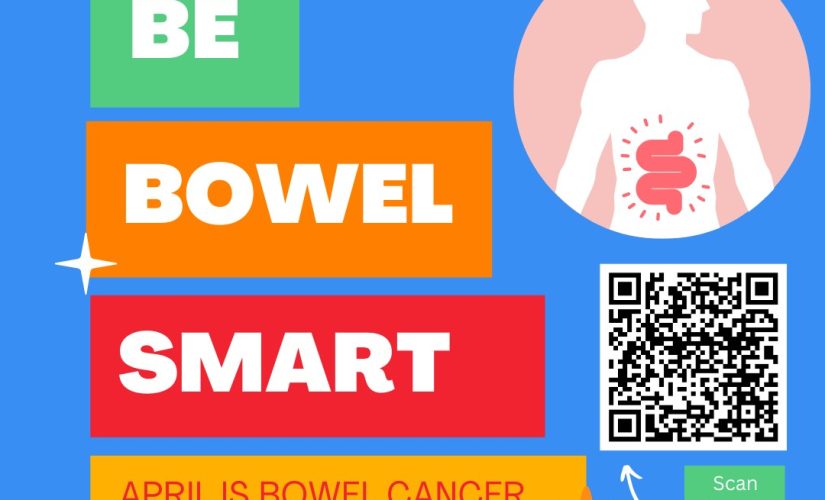April is recognised nationally as Bowel Cancer Awareness Month.  Bowel cancer is the fourth most common cancer in the UK and the second biggest cancer killer.
Bowel cancer is the fourth most common cancer in the UK and the second biggest cancer killer.
What is bowel cancer?
- Bowel cancer is also called colorectal cancer. It affects the large bowel, which is made up of the colon and rectum.
- Most bowel cancers develop from pre-cancerous growths, called polyps. But not all polyps develop into cancer. If your doctor finds any polyps, they can be removed to prevent them becoming cancerous.
- Cancer cells may stay in the bowel or they might spread to other parts of the body, like the liver or lungs.
In last week’s UK News article we shared some simple steps for good bowel health. This week we are sharing some further information about screening. Screening is a way of testing healthy people to see if they show any early signs of cancer.
Bowel cancer screening can save lives. Screening aims to detect bowel cancer at an early stage, when treatment has the best chance of working. The test can also find polyps (non-cancerous growths), which might develop into cancer. Polyps can usually be removed, to lower the risk of bowel cancer.
What is bowel cancer screening?
Each of the bowel cancer screening programmes in the UK use home tests called the Faecal Immunochemical Test (FIT). FIT looks for hidden blood in poo. If you’re registered with a GP and within the eligible screening age range, a test will be automatically posted to you, so you can complete it in the privacy of your own home.
In England from April 2021, the NHS in England will gradually reduce the age range for bowel screening. This will be phased over the next four years to include people aged 50-59.
In Scotland, screening starts from age 50. In Wales you will be invited to take part in bowel cancer screening if you’re aged between 55 and 74.
You will be invited to take part in screening every two years until you reach the age of 75.
If you are below the screening age and are worried you may have symptoms of bowel cancer, go to see your GP. Bowel cancer is more common in people over the age of 50, but it can affect anyone of any age.
Faecal immunochemical test (FIT)
The bowel screening programmes across the UK uses a test called a Faecal Immunochemical Test (FIT). The test has a stick attached to the lid. This is used to take one small poo sample and then placed back into the tube. You will be given a self-sealing, freepost envelope to send the test back to the screening centre. Full instructions and a detailed information leaflet will be sent to you with your invitation and test. You will get your test results in about two weeks.
Most people will be told no further investigation is needed. This doesn’t mean that you don’t have or won’t get bowel cancer so you should still see your GP if you have any symptoms. You will receive another test in two years.
Some people will be told that further tests are needed. This doesn’t mean you have cancer. The bleeding could be caused by a non-cancerous growth or another health problem. You will be offered more tests, such as a colonoscopy, to find out what is causing the bleeding.
For further information, visit the NHS website.
We have compiled a range of resources that you can print off and display at your sites:
- Bowel cancer fact card
- Symptoms poster
- Diary for recording symptoms
- Guide for maintaining good bowel health
- Graphic with QR code, where you can access all these resources in one place
